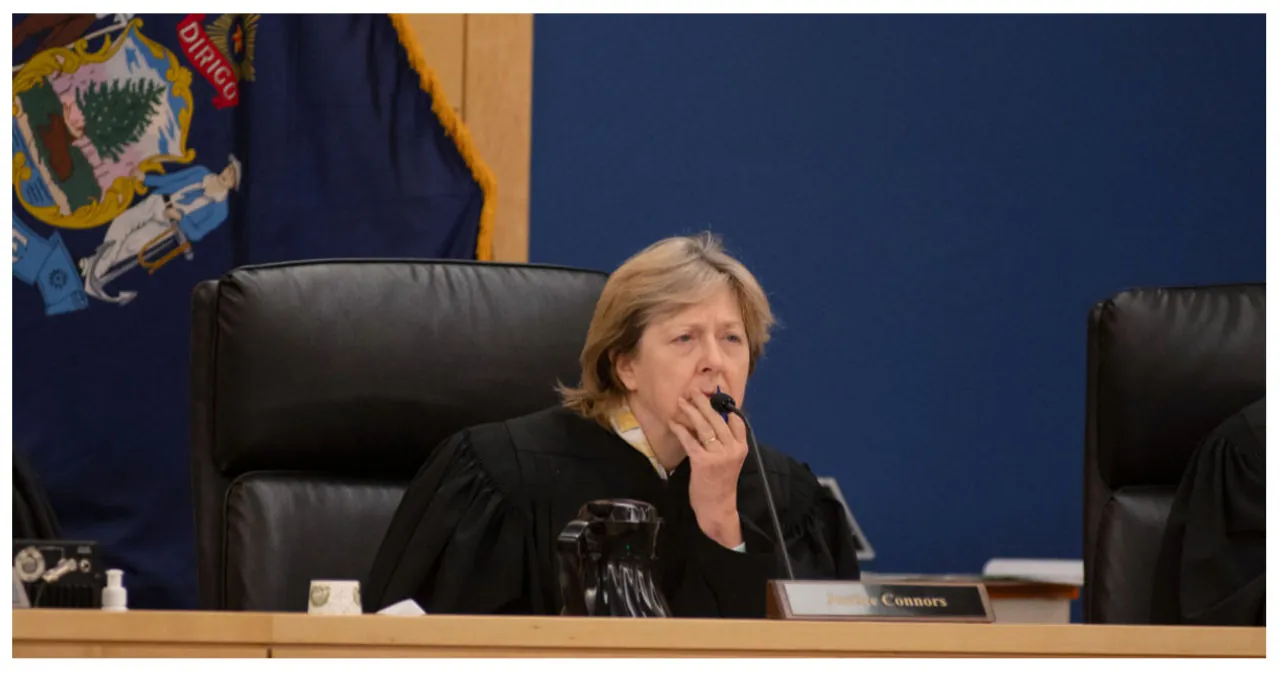ai express – The complaint against a judge on the Maine Supreme Judicial Court alleges that she should have recused herself from two cases but failed to do so.
Lawyer Thomas Cox has filed a complaint with the Maine Committee on Judicial Conduct, alleging that Justice Catherine Connors violated Maine’s Code of Judicial Conduct. According to Cox, Connors failed to recuse herself from two foreclosure cases that were brought before the state’s top court.
Connors, who previously worked as a lawyer representing banks, has faced criticism regarding her impartiality in making decisions on cases involving banks. This criticism arises from her past representation of banks and the fact that she was the deciding vote in a case favoring a bank. As a result, concerns have been raised about her ability to make unbiased judgments in similar cases.
Connors, a lawyer with a firm that had a longstanding relationship with the Maine Bankers Association, dedicated 30 years of her career to representing mortgage owners and servicers in cases that were brought before the supreme court, according to the complaint.
According to a statement from Barbara Cardone, the director of legal affairs and public relations for the judicial branch, the committee does not provide comments on disciplinary complaints or disclose the reasons behind a judge’s decision to recuse themselves.
Cardone emphasized that the choice to recuse is a personal decision made by the individual justice or judge.
According to the expert, judges have a responsibility to recuse themselves when it is necessary, but they also have a duty to not recuse if it is not necessary. Before making a decision, judges must carefully consider both of these duties.
In January, Connors played a crucial role in two opinions by voting with the majority. One such case was Charles Finch against U.S. Bank, where her affirmative vote led to a 4-3 decision in favor of the bank. This decision overturned a previously settled ruling from 2017.
The decision in Finch’s case in January effectively overturned the 2017 ruling. Lenders are now permitted to initiate foreclosure proceedings for full payments, even if they have made errors in determining the amount owed by borrowers during the default process. The recent Supreme Court decision acknowledged that the lender had made a mistake in calculating the debt of a woman from Oxford County but left it to a lower court to determine whether she must continue making payments or if she can retain her home without any further financial obligations.
According to the Maine Judicial Code of Conduct, judges are required to recuse themselves from any proceeding where their impartiality could reasonably be doubted. The code further states that if a reasonable person, with knowledge of all the facts, would question a judge’s ability to remain impartial, the judge should voluntarily excuse themselves from the case.
During her tenure as a private lawyer, Connors advocated for clients who had “significant financial stakes,” according to the complaint. In 2017, she submitted a brief on behalf of U.S. Bank and also filed a brief in support of the Federal National Mortgage Association in another case that same year.
According to Cox, it was necessary for her to step aside from Finch’s case as any fair-minded individual would question her capacity to remain unbiased. Had she done so, the vote would have resulted in a 3-3 tie, thereby upholding the initial court’s decision in favor of Finch.
Cox also raised concerns in the complaint about Connors’ involvement in the J.P. Morgan case. The complaint was submitted prior to the issuance of the opinion, in which Connors cast her vote as part of the majority.
According to the complaint, the opinions of the individual were already established and are now reflected in the language used in the Finch case.
In early 2020, Gov. Janet Mills appointed her to the court, marking her first time serving as a judge.
During Connors’ confirmation hearing, she mentioned that she would need to review the cases, but she anticipated having to recuse herself from a substantial number of foreclosure cases in which she had previously represented banks in appeals.
According to Connors, it is important for a judge to carefully consider the specific circumstances of each case when there is even a hint of impropriety. In such situations, she believes it is best to err on the side of recusal rather than take any chances.
Read More: Family of Texas Man With Autism Fear He Was Lured Away by Stranger Online
The complaint process through the judicial conduct committee maintains confidentiality, unless the judge or committee determines to make the proceedings public. The individual who files the complaint is permitted to discuss their concerns.
According to Cox, the most favorable result is that the matter was addressed openly. He believes that resolving such issues should not be done in a confidential manner.
Resolving a complaint usually takes around three months, although there are instances when it may take longer, according to the committee’s website.

